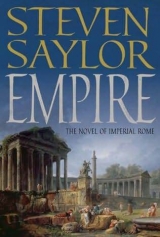
Текст книги "Empire"
Автор книги: Steven Saylor
Жанр:
Исторические приключения
сообщить о нарушении
Текущая страница: 6 (всего у книги 45 страниц)
PART II
TITUS AND KAESO THE TWINS
AD 40
“Impressive? I suppose. But so is Alexandria,” said Kaeso Pinarius, surveying the heart of Roma from the summit of the Capitoline Hill.
The Temple of Apollo atop the Palatine dominated the skyline; adjacent to the temple, the imperial complex had been much built up since the time of Augustus and presented a jumble of tile rooftops, aerial gardens, and colonnaded terraces. Directly below was the Forum with its procession of grand edifices along the Sacred Way, from the Senate House to the round Temple of Vesta and beyond. To the north and east lay the other hills of Roma, and nestled among them the concentration of towering tenements, some as tall as seven stories, in the crowded Subura.
“Impressive? It’s incredible! Alexandria simply can’t compare. Nor can any other place I’ve seen.” Kaeso’s twin brother, Titus, could hardly contain his enthusiasm. At the age of twenty-two, Titus could not claim to have travelled the world, but their late father had once taken them on a trip to Antioch, and he and Kaeso had stopped in several cities, including Athens, on their journey to Roma. “In Alexandria, all the streets are laid out in a grid. Every corner is like every other. It’s so regular and boring. But Roma is all hills and valleys and streets as jumbled as a pile of serpents, and huge buildings everywhere you look.”
Kaeso nodded. “Yes, it’s a mess.”
“It’s magnificent!”
“‘Magnificent’ would describe the Temple of Serapis in Alexandria, or the Great Library, or the Pharos lighthouse, or perhaps the Museum-”
“But none of those can rival the Temple of Jupiter,” said Titus. He looked over his shoulder and up at the grand structure with its immense columns and pediment roof surmounted by a gilded statue of the greatest of the gods in his quadriga, glimmering under the slanting light of a bright November sun. Titus turned in a slow circle, taking in the view in every direction, enchanted by the sinuous course of the shimmering Tiber, awed by the sheer immensity of the city. “Surely, brother, this is the most magnificent sight on earth.”
“Father certainly thought so. How he loved to reminisce about his beloved Roma!” Kaeso sighed. “If only he were still alive, to be here with us today.”
Titus nodded. “He was supposed to be here. He would be here, and so would mother, if the fever hadn’t taken them last year. Fate was cruel to our parents, Kaeso. More than anything, they wanted to return to this city. At last the opportunity came – and then Fortune snatched it away. But Fate has been kinder to us, eh, brother? We are finally home.”
“Home?” Kaeso shook his head. “We were babies when father and mother fled from the city. We have no close kin here, except the Acilii, who severed all ties with our mother. Father’s parents died before we were born-”
“Not Grandmother Camilla. She died on the journey to Alexandria. Don’t you remember?”
“I remember father telling us that, but I have no memories of her.”
“I do, I think.” Titus frowned.
“I don’t. And I have no memories of Roma, do you? We were babies when we left. We grew up in Alexandria. Alexandria is our home.”
“ Was our home, Kaeso. We were born Romans, we have always been citizens of Roma, and now we are truly Romans again. It’s what our father wanted. Thanks to Claudius-”
“Did I hear my name? Being spoken k-k-kindly, I hope.” Claudius was nearby, stooping over to peer at the sculptor’s mark on a statue of Hercules. He straightened, groaning a bit – at fifty, his back was suffer than it once had been – and ambled towards them. One of his toes had developed a blister from walking, but he bore the pain with a smile. The sons of Lucius Pinarius and their wives were taking their first tour of the city, and it was his pleasure to act as their guide.
“I was reminding Kaeso of how grateful we should be for all you’ve done,” said Titus.
“I only wish I could have arranged for you and your father to return to Roma long ago. I thought it might be possible when Tiberius p-p-put Sejanus to death. Can that have been nine years ago? How the time flies! But getting rid of that treacherous viper didn’t make Tiberius any less unreasonable; if anything, Uncle became more suspicious and fearful than ever. Two of my nephews he put to death for plotting against him, locking them away and letting them starve to death, even as he indulged his every appetite – and not just for food.”
“What do you mean?” said Kaeso.
“In his declining years, Uncle decided to followed his impulses, no m-m-matter where they might lead.”
“His impulses?” said Tiberius.
Claudius glanced over his shoulder. His young wife and the wives of the twins were taking a rest, sitting on the steps of the Temple of Jupiter while their attendant slaves stood by. The three women smiled and waved, then went on with their conversation. No one else was close enough to hear. Why had he brought up the subject of Tiberius and his appetites? The fact was, Claudius needed to unburden himself. For years, he had had no one to whom he could speak in an unguarded way, not even his slaves, who either could not be trusted or upon whom he did not wish to thrust the responsibility of keeping his secrets. Looking back, he realized that there had never been anyone to whom he could speak with utter freedom except his dear friend and cousin Lucius Pinarius. Since the twins had arrived in Roma, Claudius found himself confiding in them more and more, as once he had confided in their father.
“Tiberius’s behaviour in his last years was truly shocking. The m-m-man indulged every desire, without the least restraint. What must Augustus have thought, looking down from Olympus?”
“What sort of desires?” asked Titus, curious to know more.
“How I dreaded my visits to that debauched retreat of his at Capri. At least he had the sense to confine his excesses to his private island! All those n-n-naked children wandering about. Not just nubile boys and girls, I tell you, and not just slaves, but freeborn children! Tiberius coined his own terms for them. In bed they were his spintriae – his tight little sphincters. In his bath, they were his little minnows. Uncle said there was no greater pleasure for an old man than to settle in a warm p-pool and be nibbled and suckled under water by tiny mouths while he gazed up at the pornographic mosaics on the ceiling.”
“Mosaics with pictures of people having sex?” Titus laughed. “I’ve never seen such a thing! What do you make of that, Kaeso?”
Kaeso shook his head. Claudius frowned, a bit flustered by Titus’s lack of proper outrage, but he was encouraged to see that Kaeso appeared to share his disdain.
“Oh, how Tiberius loved his p-p-pornography! The whole place was like a museum of sex, filled with the most salacious paintings and statues imaginable. I thought to find escape in the library, but the shelves contained nothing but smut – scroll upon scroll of the most salacious stories, especially written for Tiberius by slaves acquired solely for their skill at spinning such tales. Bedtime stories, he called them. Since most of his bedmates were too ill-educated or too young to read, Tiberius had artists illustrate the texts, so that he could use the pictures to show his partners exactly what he wanted them to do.”
Titus elbowed his brother. “What do you think of that, Kaeso? I never saw such books at the Great Library in Alexandria!” Kaeso made a sour face.
Claudius blinked. “But what started me on this dreadful subject? Ah, yes, my efforts to bring your father back to Roma. Well, eventually Tiberius lost all interest in running the state; he left that to his underlings and retired full-time to Capri. But every so often, when I could get Uncle to discuss something other than the gratification of his p-p-penis, I would bring up the case of your father. I pointed out that Lucius was my cousin, and that Sejanus’s agents had kept him under surveillance for years, and not once had he been heard to utter a treasonable sentiment, or to practise astrology, for that m-m-matter. I begged Tiberius to rescind your father’s banishment. But Uncle was not a forgiving sort. He wouldn’t hear of it. He wouldn’t even listen to me – except once, when I made the mistake of mentioning that Lucius had twin sons, trying to wring some pity from him, and do you know what Tiberius said? ‘How old are they? Are they pretty?’ By that time you were old enough to wear togas, and I told him so, whereupon he lost all interest and ordered me never to m-m-mention my cousin Lucius Pinarius again.”
Claudius sighed. “So, we simply had to wait for Tiberius to die. How the people detested him, by the end. When word of his death at Capri reached Roma, there was d-d-dancing in the streets. You should have seen the jubilation that swept through this city when my nephew was named his successor – the only son of Germanicus whom Tiberius hadn’t managed to kill…” His voice trailed away. He blinked and twitched.
“There were celebrations in Alexandria, too,” said Titus. “Back in Egypt, everyone says Gaius Caligula will make an ideal ruler. The legions love him. He’s young, energetic, sure of himself.”
“Yes, very sure of himself, as only a g-g-god can be,” muttered Claudius, averting his eyes. “At any rate, amid all the celebration, our new emperor expressed his willingness to hear pleas for amnesty, including mine for your father. It was granted. But the wheels of state turn slowly – you wouldn’t believe the layers of bureaucracy in this city – and of course your f-f-father needed time to settle his affairs in Alexandria before he could leave. In the last letter I received from him, he was finally making preparations for the journey. How happy Lucius was that he had convinced the two of you and your wives to come along with him. And then – a fever took both him and Acilia. So sad! But you two are here now, along with those lovely wives of yours. One always hears that Alexandrian women are the world’s most beautiful; Artemisia and Chrysanthe are proof. But here, what’s this?”
Sunlight glinted across the gold amulet that Kaeso was wearing on a chain around his neck. With a bemused expression, Claudius reached out to touch it. Kaeso smiled. “It’s a fascinum, according to our father, though you wouldn’t know to look at it. He told us it was very old, maybe even older than Roma itself.”
“Ah, yes, I thought it looked familiar. By Hercules, I had forgotten all about it! It was I who informed your father about this amulet’s history, before you boys were born. So, when he died, he p-p-passed the fascinum to you, Kaeso? I can use it to tell the two of you apart. I never knew twins who looked more alike!”
“I’m afraid you’ll need to learn some other trick to distinguish us, then,” said Kaeso. “Father’s will didn’t specify which of us should inherit it, but since his estate was split equally between us, we’ve agreed to share the fascinum. Sometimes I wear it. Sometimes Titus does.”
“Then twins can get along. You have improved upon the example of Romulus and Remus! I’ll wager your father never told you that it was I who came up with names for the two of you. No? It’s true. When he learned that Acilia had given b-b-birth to twins, he was in a quandary over which of you to give his own name, since Lucius had long been the traditional name bestowed on the firstborn male Pinarius. But the midwife made such a jumble of things that there was no way to tell which of you had come first. Besides, you were so identical in every way, it seemed unfair, perhaps even unlucky, to honour one of you with the firstborn’s name and slight the other. So your father decided to break with tradition and name neither of you Lucius. He asked for my advice. We decided to name one of you Kaeso, after a famous ancestor of yours from the Fabius family, a man who wore that very fascinum about four hundred years ago, if my theory is correct.”
“What about my name?” asked Titus.
“That was in memory of my mentor, the great scholar Titus Livius. Surely you’ve read his history of Roma? No? Not even the p-p-parts about the ancient Pinarii?” Claudius shook his head. “I’m sure I gave your father a copy, long ago.”
“I think it’s among the books we brought with us from Alexandria,” said Titus.
“I wonder if your father ever read it. Ah well, neither he nor his father had much interest in the past. But a man must honour his ancestors. Who else made us, and how else did we come to exist?”
“I’d prefer to live for the future,” said Kaeso with a faraway look, fingering the fascinum at his throat.
“And I’d prefer to live in the present!” Titus laughed. “But speaking of the future, how soon might we have the honour of meeting the emperor? We should like to thank him in person, not just for allowing us to return, but for restoring the honour of our father’s name. With our full rights as citizens and patricians restored, someday we might even be able to gain admission to the college of augurs.”
“How that would please the shade of your father!” said Claudius. “Of course I’d be proud to oversee your studies, and to sponsor one or b-b-both of you for admission.”
Kaeso made a face. “It’s Titus who dreams of becoming an augur, not I.”
“I brought father’s old trabea and lituus with me, from Alexandria,” said Titus. “But what about meeting the emperor?”
Claudius averted his eyes. “Yes, well, if the emperor should summon you for an audience, of course you must go. But in the great press of affairs – Caligula is so generous to so many of his subjects – it’s entirely p-possible he will forget all about this particular instance of generosity, and if that should happen, well, perhaps it’s best if you don’t remind him. Indeed, it might be b-b-best if you do nothing at all to call attention to yourselves.”
Titus furrowed his brow. “What do you mean, cousin Claudius?”
“How can I explain? Exile is a curse, but it can also b-be a blessing. Despite his sorrow at being sent so far from the city he loved, your father was fortunate to miss the terror visited on this city by Sejanus, and all the casual cruelties of Tiberius. Then, when my nephew succeeded Tiberius, it seemed that a new era was dawning, a time of hope and fresh confidence. I was eager for your father to return. So was he. P-p-perhaps we were too eager. P-p-perhaps we should have been less optimistic, and waited a little longer.” He shook his head. “It was Caligula’s father, my brother Germanicus, who should have become emperor. Everyone says so. My brother’s military skills were first-rate. His temperament was ideal. Germanicus was loved by the legions, by the people, even by the Senate. But not so loved by the gods, who saw fit to take him from us – the gods, or else Sejanus, or Livia, or Tiberius. What does it matter? They’re all dead now. All dead.”
Kaeso put his hand on the older man’s shoulder. “What are you trying to tell us, Claudius?”
“Unlike his father, my nephew was always a bit… unsound.” Claudius twitched. He wiped away a bit of drool. “I suppose that sounds judgemental, even absurd, coming from the likes of me, but it’s true. As a b-b-boy, little Gaius was troubled with the falling sickness.”
“So was the Divine Julius,” said Titus.
“Perhaps, but I suspect Caligula’s case was rather more severe than that of Julius Caesar. All through his youth he was struck by spells that rendered him b-b-barely able to walk, or to stand, or even to hold up his head. He would be dazed afterwards, unable to collect his thoughts, but he always recovered. As he grew to manhood, he seemed to outgrow the affliction, and that gave us hope. We certainly never had cause to worry about his… sanity.”
“And now?” said Kaeso.
Claudius hesitated, but once again he could not resist the need to unburden himself. “The change occurred suddenly – overnight, in fact. It was caused by a love p-p-potion given to him by that horrible wife of his, Caesonia. She’s much older; she was already a mother of three when they began carrying on. If you ask me, it’s unnatural for a young man to take an older partner; it should be the other way around, don’t you think? As it is with m-m-myself and Messalina.”
“Quite,” agreed Titus. “But you were telling us about the emperor.”
“Yes. Well, apparently Caligula’s lovemaking was a disappointment to Caesonia – a harlot of such vast experience – so Caesonia decided to remedy the situation by giving the boy an aphrodisiac. The gossips say she fed him the substance the Greeks call hippomanes – a fleshy mass sometimes found on the forehead of a newborn foal.”
Kaeso wrinkled his nose. “It sounds disgusting.”
“Does it work?” asked Titus.
“One m-mixes it with wine and herbs to make it palatable,” said Claudius. “It’s a well-known aphrodisiac – various scholars mention it – but in all my research I can find no other case where it drove a man m-mmad. I suspect Caesonia adulterated it with some other ingredient.”
“She deliberately poisoned him?” said Titus.
“No. Whatever ingredient she added was probably harmless by itself, but when mixed with the hippomanes created a combination that was toxic. That at least is my theory. I have a suspicion that Caesonia may have duplicated the very love p-p-potion that drove Lucretius mad.”
The twins looked at him blankly.
“The p-p-poet Lucretius,” he explained, “who lived in the days of the Divine Julius. They say Lucretius’s madness came and went. In his lucid moments he was able to write his great work, On the Nature of Things, but eventually he was driven to suicide.”
“Are you afraid Caligula may kill himself?” said Kaeso.
Claudius shivered, hugged himself, and whinnied like a horse. The twins feared he was having a fit, but he was only laughing. “Oh, no, Kaeso, that is not what I’m afraid of! Caligula’s behaviour makes even the worst excesses of Tiberius seem trivial. The stories I could tell you – but look, here’s Messalina, and your lovely wives.”
The women rejoined their husbands. In all of Roma, it was unlikely that one could find three more beautiful women standing side by side. The twins had chosen wives who might have passed for siblings themselves; Artemisia and Chrysanthe both had buxom figures and wore their thick black hair in long plaits, after the Egyptian fashion. Messalina was the youngest of the three, but she affected a matronly look, with her black hair pulled back from her face and pinned in an elaborate coiffure, and a voluminous stola that covered her from head to foot and concealed her arms as well. At a distance, the loose stola concealed her condition; seen closer, her swollen breasts and protruding belly made it obvious that she was pregnant.
“What have you lovely females been talking about all this time?” said Titus, glancing at Messalina’s breasts even as he took Chrysanthe’s hand.
“This and that,” his wife said. “Hairstyles, mostly. Artemisia and I look terribly provincial. Messalina promises to send the slave who dresses her hair, to give us instruction on the latest Roman styles.”
“Don’t complicate your b-b-beauty too much,” said Claudius. “You’re lovely as you are.” He kissed Messalina on the forehead and gently, dotingly touched her just above the navel.
Kaeso scowled and furrowed his brow. Titus pulled him aside and whispered in his ear, “What’s wrong with you, brother? You’ve been in a foul mood all day.”
“That girl is young enough to be his granddaughter!”
“That’s not our business. Try not to show your disapproval so openly.”
“Back in Alexandria-”
“We’re in Roma now. Things are different here.” Titus sighed. Back in Alexandria, his brother had taken up with some strange people and acquired some very intolerant ideas. It was their father’s fault, for having given his sons too much freedom when they were young. Both Titus and Kaeso had received traditional instruction at the academy near the Temple of Serapis, and had pursued the usual curriculum of philosophy, rhetoric, and athletics. But when the school day was done, Kaeso had spent his free time in the Jewish Quarter, drawn there by a fascination with mysticism, and the so-called scholars in the Jewish Quarter had filled his head with all sorts of bizarre ideas that were neither Greek nor Roman. Their father, too busy with business, had never sought to divert Kaeso from these dubious influences. That role would have suited a grandfather, thought Titus, an older, wiser man with patience and time to spare, but Fate had robbed them of their grandfather. They had grown up knowing no grandparents at all, a most unRoman circumstance for young patricians.
But they were in Roma now, at last, and they could ask for no better friend and guide than their cousin Claudius.
“Shall we press on to the Palatine?” said Claudius. “We can see the Hut of Romulus, the Temple of Apollo-”
Messalina rolled her eyes. “Husband, you can’t expect them to see all of Roma in a single day!”
“But what am I thinking? You must be weary, my d-d-dear. It was brave of you to come out at all.”
“I could hardly miss this opportunity to welcome your dear cousins.” Messalina looked from face to face. Her eyes lingered first on Kaeso, then on Titus.
“But you mustn’t overexert yourself. I’ll fetch the l-l-litter and send you straight home.”
The litter arrived, borne by a team of brawny slaves. Two of them lifted Messalina into the cushioned box. Claudius kissed her farewell, then closed the richly embroidered curtains so that she could travel home in privacy. As the litter was departing, Messalina parted the curtains with her forefinger and looked out. Her gaze fell on Titus, who gazed back at her.
Claudius and the women were discussing the rest of the day’s itinerary and did not see, but Kaeso saw and heard everything – the penetrating look that darted back and forth between his brother and Messalina, the way she narrowed her eyes and parted her lips, and the grunt from Titus, followed by a sigh.
The curtain closed. The litter receded from sight. Titus turned to face Kaeso, who scowled and shook his head.
Titus raised an eyebrow and flashed a crooked smile. “We are in Roma now, brother.”



![Книга Империя атома / Empire of the Atom [= Мутант] автора Альфред Элтон Ван Вогт](http://itexts.net/files/books/110/oblozhka-knigi-imperiya-atoma-empire-of-the-atom-mutant-148051.jpg)




